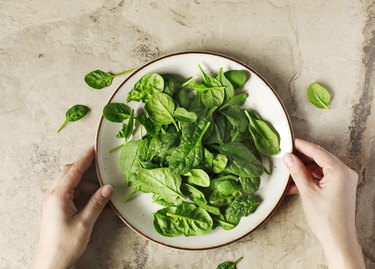
At some point, you may have been warned to stay away from nitrates in food, but that blanket statement is a little misguided. While synthetic preservatives, like sodium nitrate, may cause health problems, the naturally occurring nitrates in vegetables and fruits can contribute to your health.
But what are nitrates, and where are they found? And what's the difference between a nitrite versus a nitrate? Nitrates and nitrite are both nitrogen compounds that widely exist in plants, water, dirt and air, but the difference lies in their chemical composition.
Video of the Day
Video of the Day
Nitrite vs. Nitrate
The main difference between nitrites and nitrates lies in their chemical composition. Nitrites contain a nitrogen atom combined with two oxygen atoms, while nitrates have three oxygen atoms combined to their nitrogen.
The nitrates that you get from the food you eat are broken down and converted into nitrites and nitric oxide, according to an October 2018 report in Aging and Disease. The report notes that the nitric oxide that's formed from the intake of nitrates play a role in protecting the stomach lining and preventing heart disease and metabolic diseases.
This is not to be confused with synthetic nitrates and nitrites, like sodium potassium nitrate or nitrite, which is added to processed foods like bacon and hot dogs as a preservative. When you consume synthetic nitrates or nitrites, your body breaks them down into a compound called nitrosamines, which have been linked to an increased risk of cancer, according to the Environmental Working Group.
The Agency for Toxic Substances and Disease Registry adds that if you consume unusually high levels of nitrates or nitrites, it can lead to a condition called methemoglobinemia, which is a decreased ability for your red blood cells to carry oxygen to your tissues.
This can cause several symptoms, including drops in blood pressure, increased heart rate, headaches, abdominal cramps and vomiting, and in severe cases, death. However, exposure to levels of nitrates that high are extremely rare and, again, adverse health effects are most commonly associated with synthetic nitrates.
Read more: The Harmful Effect of Sodium Nitrite in Food
Nitrates in Vegetables and Fruits
Naturally occurring nitrates and nitrites don't present the same issue because they're often coupled with nutrients like vitamin C and antioxidants that prevent them from converting into nitrosamines. Vegetables are actually the highest source of natural nitrates, while fruits trail somewhere behind them. The vegetables that are the highest in nitrates include:
- Green, leafy vegetables (like spinach, mustard greens, arugula, kale, Swiss chard and lettuce)
- Beetroot
- Radishes
- Turnips
- Watercress
- Bok choy
- Chinese cabbage
- Kohlrabi
- Chicory leaf
- Celery
- Onion
- Garlic
Some fruits do contain nitrates, but the amounts are generally low. The fruits that do contain nitrates include:
- Watermelon
- Apples
- Bananas
- Grapes
- Kiwi fruit
- Nectarines/peaches
- Pears
- Oranges
- Strawberries
The report in Aging and Disease points out that approximately 80 to 90 percent of dietary nitrates come from green, leafy vegetables. The second biggest source is drinking water, which provides 15 to 20 percent of daily intake. The Agency for Toxic Substances and Disease Registry adds that, besides fruits and vegetables, other food and drink sources of nitrates include:
- Cured meats
- Fish
- Dairy products
- Beers
- Cereals
Read more: 6 Reasons to Avoid Eating Too Much Spinach
Avoiding Synthetic Nitrates
Although you don't have to worry about the nitrates found in fruits and vegetables, which also provide many other beneficial nutrients, it is a good idea to lower your intake of nitrates and nitrates that are added to food during processing. The Environmental Working Group provides some tips for avoiding added nitrates in your diet:
- Limit consumption of cured meats, like hot dogs, bacon, sausages and deli meat. Whenever possible, opt for nitrate- and nitrite-free options.
- Get your water tested, especially if you have well water. Synthetic nitrates are often added to drinking water or enter well water through the soil. If your water has high levels, get proper filtration.
- Boost your intake of antioxidants and vitamin C. These nutrients prevent nitrates from converting to nitrosamines, the problematic compounds.
- Read labels carefully and avoid anything that contains sodium nitrate, sodium nitrite, potassium nitrate and potassium nitrite.